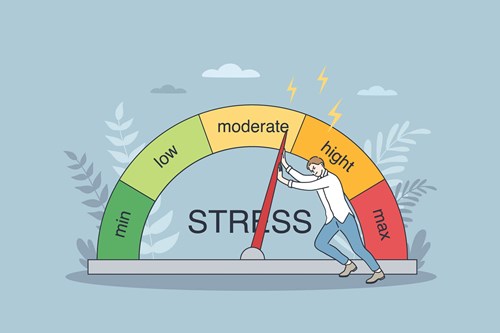To round off our Stress Awareness series, we are finishing with the theme of control.
How often do you feel like you are not in complete control of your everyday life? Whether this is the overwhelming feeling of knowing you have lots to do or waiting for your train to arrive, feeling your heart rate rise with every minute the board increases the delayed time.
How does self-efficacy affect your ability to control your stress?
Self-efficacy is your belief in your own ability to be successful within tasks, events, and outcomes.
This includes achieving your aspirations but also managing your everyday life. A large amount of research has demonstrated quite convincingly that possessing high levels of self-efficacy acts to decrease people's potential for experiencing negative stress feelings by increasing their sense of being in control of the situations they encounter.
The perception of being in control (rather than the reality of being in or out of control) is an important buffer of negative stress. When people feel that they are not in control, they start feeling stressed, even if they are in control and simply don't know it. Another reason that people feel stressed is when they feel out of control because they do not possess the appropriate coping skills, resources, etc. to adequately cope with the situation.

There are many components that are at play within a stressful situation that an individual may incorporate. These are internal, rather than specific to the situation. Whereas external components that affect the stress can include Intensity, Duration, Number and Level of expertise.
-
Intensity
This relates to the strength of the stressful event. For example, having a laptop with a low battery may not seem highly stressful, but the intensity is increased when that laptop is needed for a meeting in 10 minutes and you cannot find the charger.
-
Duration
This is how long the stressful situation lasts. Not being able to find your keys for 30 seconds, then finding them, may seem minor. However, if you are looking for 10 minutes or more, the stress is increasing the longer it goes on.
-
Number
This is the quantity of stressful events. So, if you wake up late to an important meeting, your stress levels are likely to be high. These can then be even more negatively affected if your car will not start.
-
Level of expertise
This is related to how skilled you are/resources you must deal with the stress. If you are familiar with handling a situation the perceived stress will be lower, for example playing a musical instrument in front of an audience may be daunting the first time, but with experience and increased expertise, this will become less stressful.
What should you do about things you cannot control?
It is very easy to become consumed by things in life that you cannot control, however, this is likely to lead to the desire to micromanage people, situations or events, leading to detrimental results across many areas of your life. Instead, consider some of these tips from Psychology Today -


1. Determine what you can control
Can you control the thing you are stressing about? This may seem like a simple question, but people spend a lot of their energy focusing on things they cannot control or change. So, by asking yourself this question, you can start to recognise quickly what can be controlled or not. Helping you to recognise and let go of stresses you cannot control and helping you to focus on what you can control.
2. Focus your influence
Although you cannot control or change everything, you can affect how they may influence you.
Not got the promotion you wanted? This is an example of something you cannot control or change now, but you can take time to consider how this may influence your wellbeing and what your next steps could be.
3. Identify your fears
Consider what it is that you fear- therefore causing your current stresses. Are you in fear of ending up unemployed, in debt, ill-health? Etc… A lot of times people are consumed by these thoughts to the point that they do not actually consider what they would do IF this situation happened.
The worst-case scenario is hardly ever as bad as envisaged and people underestimate their ability to deal with problems in life. Acknowledging these scenarios and that you can gain the resources to deal with these situations may help steer your energy towards things that you can immediately control.
4. Differentiate between ruminating and problem solving
Is your thinking productive? How often do you think through negative situations or outcomes in your mind? Ultimately this is not helpful, but solving a problem is.
Consider if you are spending time going over these scenarios and getting nowhere.
Or whether instead of solving a problem within your control, are you wasting your time avoiding doing what needs to be done. If this is the case, consider what you may need to help you to switch your thinking to focus on the solution.
Example: Putting off a phone call due to uncertainty of the outcome. Instead of playing over the possible negative outcome in your mind, consider an action plan for both outcomes, helping you to then be more prepared to then make that call and move forward.
"Many a calm river begins as a turbulent waterfall, yet none hurtles and foams all the way to the sea." - Mikhail Lermontov
We provide fully funded support to the self-employed and gig economy workers across Greater Manchester, including expert Health and Wellbeing support. If you would like to find out more about EnterprisingYou, register online, email info@enterprising-you.co.uk or call 0161 667 6900 to speak to one of our business coaches.
More information about the EnterprisingYou programme can be found here.
